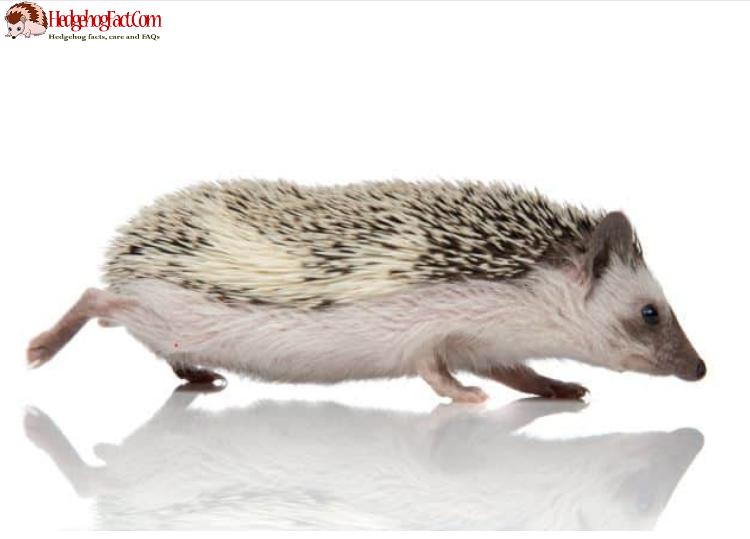Hedgehogs are fascinating creatures with their unique appearance and behavior, which have made them popular as exotic pets. One of the questions that often come to mind when discussing hedgehogs is their speed. Are Hedgehogs Fast? A Comprehensive Analysis, Hedgehogfact.com will provide a comprehensive analysis of the speed of hedgehogs based on the information available on the internet.
Hedgehog facts
Mammals in the Erinaceidae family include hedgehogs. Its spiky coat, which serves as a sort of defense against predators, distinguishes them. The world is home to hedgehogs in several locations, including Europe, Asia, Africa, and New Zealand.

Hedgehog species range in size and appearance from one to seventeen. The European hedgehog, African pygmy hedgehog, and long-eared hedgehog are a few common species of hedgehogs. In the wild, they can live for about seven years and weigh up to 1.1 kg.
Hedgehogs range in size from 14 cm to 30 cm, and their highest sustained speed is 9.5 km/h. They live in grasslands, hedgerows, woodlands, and meadows and are carnivores.
The average speed of hedgehogs
Despite their lack of speed, hedgehogs can nonetheless move very swiftly when necessary. The average speed of a hedgehog, as you indicated, is about 4 miles per hour, which is comparable to the pace at which a person jogs.
Hedgehogs, however, aren’t made for persistent running; instead, they usually only run briefly to get away from danger or catch prey. Hedgehogs in their natural habitat primarily use their keen hearing and sense of smell to explore their surroundings and find food.
Hedgehog speed in danger
Hedgehogs can move far more quickly than usual when they are in danger. The natural defense strategy used by hedgehogs to ward off predators involves curling up into a ball. If they are unable to flee by rolling up, they might turn to race away as quickly as they can.

Hedgehogs may accelerate to speeds of up to 6 miles per hour in certain circumstances, which is far faster than their typical pace of 4 miles per hour. Hedgehogs are not designed for continuous running and can easily become exhausted if they must sprint for extended periods. To avoid needless stress or tiredness, it is essential to give them secure environments and shield them from potential threats.
Comparison with other animals
As compared to many other species, hedgehogs are not among the fastest. Rats and mice, among other small mammals, can run more swiftly than hedgehogs, for instance. The speed of many predators, such as wolves and foxes, who can run up to 45 mph, is slower than that of hedgehogs.
Hedgehogs, on the other hand, have evolved for agility and can quickly change direction while running, making them good for navigating their natural settings. The thorny coat and ability to ball up are two further adaptations that hedgehogs have that reduce their susceptibility to predators.
Even though they may not be the fastest animals, hedgehogs have unique adaptations that allow them to thrive in their natural habitats and escape danger.
Factors affecting the speed of hedgehogs
Hedgehogs’ speed can vary depending on several factors, such as:
Age: Juvenile hedgehogs may move more quickly than older ones since they are more energetic and active.
Health: A hedgehog in good health will often move more quickly than one that is unwell or damaged.
Habitat: The hedgehog’s speed might be impacted by the topography of its environment. Hedgehogs may find it difficult to run on rocky or uneven terrain because they are better adapted for running on level surfaces.
Temperature: Because hedgehogs have a cold-blooded constitution, the temperature of their environment can have an impact on their speed. In warmer weather, they are more active and can run more quickly.
Hungry hedgehogs may move more quickly in search of food or to elude predators.
Hedgehogs are not often known for their swiftness, but when the situation calls for it, they can move rapidly. Its spiky coat and capacity to curl into a ball for cover, rather than running, serve as their main defenses.
The biology behind hedgehogs’ speed
Hedgehogs have an interesting anatomy that allows them to move quickly despite their small size. They have strong, muscular legs that are built for quick bursts of movement, so they can sprint short distances to escape danger or catch prey.

Hedgehogs are developed for agility and have a low center of gravity, which allows them to quickly change their direction when running. Their agility is further aided by their spines, which are used for defense as well as to help them grasp the ground while running and turning quickly.
The size and shape of a hedgehog’s body also affect its speed. They can move quickly through tight areas and move about more freely in their natural settings because of their small stature and short legs.
Due to their keen senses of smell and hearing, hedgehogs are also able to detect and avoid potential dangers like predators or other obstructions in their path. This sensitivity enables them to move quickly and avoid obstacles when running.
Hedgehogs’ unique morphology and perceptive abilities allow them to move quickly and efficiently through their surroundings.
Conclusion
In conclusion, hedgehogs are not particularly fast animals, with an average speed of around 4 miles per hour. However, they have unique anatomy and sensory adaptations that enable them to move quickly when needed, such as when escaping danger or pursuing prey. Hope the article Are Hedgehogs Fast? A Comprehensive Analysis will provide you with useful information.





